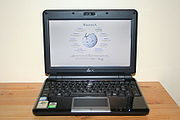Netbook shipments grew from 500,000 in the first quarter of 2008 to 4.4 million in the third, and they could double this year, despite the economic slowdown, according to Gartner research and other analysts, as reported in the New York Times.
 For e-book-lovers and for publishers seeking to expand their markets, that’s good news.
For e-book-lovers and for publishers seeking to expand their markets, that’s good news.
Netbooks lend themselves better to E reading than do traditional desktops. Some desktop users may even be ditching larger machine in favor of this cheaper more portable approach, with some of the netbooks costing a mere $200.
"Analysts," says the Times, "expect PC sales to fall in 2009 for just the second time in the last two decades, with desktops falling even faster than they did in 2007 or 2008."
Plus, something else might give the e-book market a boost in this era of more-portable hardware. What if Netbook-makers shrink the size of the nonscreen components and along the way also let you use the devices in a tablet mode (like the OLPC XO-1)—yet better for E reading? It’s bound to happen.
Netbooks a major factor in recent e-book growth?
Meanwhile e-book sales shot up stunningly last year, even though they’re still a fraction of the total book market, and one wonders how much of this could be not from the iPhone or Kindle or Sony reader but rather from those millions of netbook customers. Anyone care to speculate on the growth contributions that the various kinds of devices are each making? Netbooks almost surely are at least a major reason. Remember, the ones running XP or trying to run Vista can work with Mobipocket and other software used to read commercial e-books.
With this in mind, I’d heartily recommend that mass publishers consider cross-promo deal with software providers and netbook manufacturers, just as Harlequin and Grand Central have been doing with Sony.
The Microsoft angle
The rise of Netbooks is bad news for anyone at Microsoft or other companies betting on a Windows-centric approach, (even if XP is catching on for Netbooks and even the forthcoming Windows 7, being less of a resources hog than Vista, could help somewhat). Many of the Netbooks run on Linux, which means that the current Microsoft Reader is out as a choice.
The slugs at Mobipocket, moreover, had also better get hopping with a Linux-friendly app in addition to the currently AWOL app for iPhones. eReader has already said it will do its best toward the development of apps for Linux. Will eReader become the app on Linux systems because competitors hesitated for stupid reasons, such as Amazon’s Kindle fixation? Adding to the fun, keep in mind that Google envisions the Android OS for laptops and desktops, not just cells phones. So, although XP is thriving right now in the netbook market, Microsoft ain’t seen nothing yet.
The DRM angle
 The multiplicity of operating systems, a trend that netbook should speed up, also isn’t the best news for providers of e-reading software with DRM or for those IDPF members hoping for a DRM standard. Customers will want to be able to read the same books on netbooks, cellphone and perhaps desktops. Will DRM-tainted software be able to keep up with this, given all the major platforms to aim at? Oh, how much simpler e-book tech would be without it.
The multiplicity of operating systems, a trend that netbook should speed up, also isn’t the best news for providers of e-reading software with DRM or for those IDPF members hoping for a DRM standard. Customers will want to be able to read the same books on netbooks, cellphone and perhaps desktops. Will DRM-tainted software be able to keep up with this, given all the major platforms to aim at? Oh, how much simpler e-book tech would be without it.
Speaking of e-book growth—and its encouragement: Don’t forget to share with the White House your thoughts on Read an E-Book Week.

































